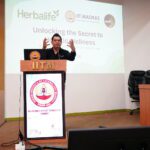‘herd immunity’ coronavirus plan is not scientific
India
healthysoch
Dr K K Aggarwal
President CMAAO, HCFI and Past national President IMA
New Delhi, March 17, 2020 :
The concept is based on the assumption that if 50 % of people ( all less than 40 years with least mortality) are infected one will be able to control the epidemic and also prevent a second wave next year.
But, vulnerable people should not be exposed to Covid-19 right now in the service of a hypothetical future. The hypothesis is to achieve “herd immunity” in order to manage the outbreak and prevent a catastrophic “second wave” next winter. The argument is generating immunity in younger people is a way of protecting the population as a whole.
We talk about vaccines generating herd immunity but, this is not a vaccine. This is an actual pandemic that will make a very large number of people sick, and some of them will die. Even though the mortality rate is likely quite low, a small fraction of a very large number is still a large number.
At the peak of the outbreak the numbers requiring critical care would be greater than the number of beds available. This is made worse by the fact that people who are badly ill tend to remain so for a long time, which increases the burden.
Second waves are real things, and we have seen them in flu pandemics. This is not a flu pandemic. Flu rules do not apply. But vulnerable people should not be exposed to a virus right now in the service of a hypothetical future.
It is increasingly clear that transmission can occur before symptoms develop. We know this is true from modelling and observational studies.
You should instead look to the example of South Korea, which, through a combination of intense surveillance and social distancing, appears to have gained some semblance of control over the virus. We can learn from South Korea, Singapore, Hong Kong and Taiwan, all of which have so far done a good job mitigating the worst outcomes despite having reported cases early in the pandemic, and in the case of South Korea, suffering a substantial outbreak.
Policy should be directed at slowing the outbreak to a (more) manageable rate. What this looks like is strong social distancing. Anyone who can work from home, should. People who do not yet work from home should be encouraged to do so. Employers should guarantee sick pay, including for contacts of known cases, and do everything they can to discourage the practice of “presenteeism”. You should not shake hands. Not with anyone. You should wash your hands for 20 seconds several times a day and whenever you enter your home (or someone else’s home). Call a halt to large gatherings. Educate people about masks and how they should be reserved for the medical professionals who need them. All this and more should have started weeks ago.






